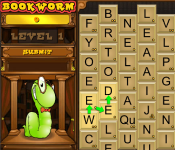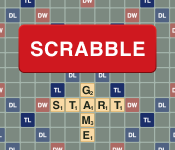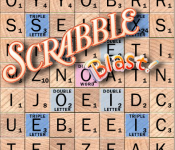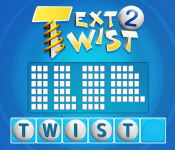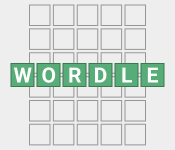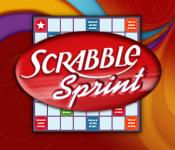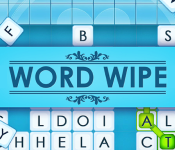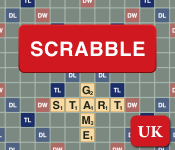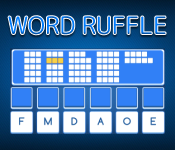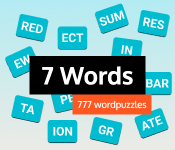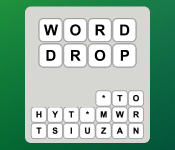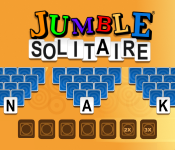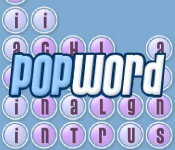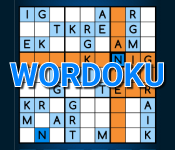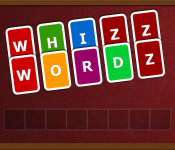Letter Arrangement Games
In letter arrangement games, players are presented with a string of random, jumbled-up letters from which they have to form words. Solving such anagrams allows players to practice creative thinking while testing their vocabulary as well as spelling. As such, these games are great for developing children and are often used for educational purposes. Points are typically scored either on the quality of words found or the number of words found.
Social word games tend to belong to the letter arrangement category. Text Twist and Word Ruffle are some examples of letter arrangement games, as is Scrabble.
Word Search Games
These are some of the most well-known types of word games. Word search games are simple yet engaging. A jumbled-up assortment of letters is laid out in a grid, usually sharing a theme or topic, and a list to the side shows the words hidden inside the grid. Players are to find and mark the words hidden, which can be horizontal, vertical or even diagonal. Some more complicated versions may even hide words backwards to increase the puzzle’s difficulty. Popular examples include Bookworm, Scrabble Blast and Word Drop.
Crossword Games
Crosswords are typically harder compared to other word games as players must solve clues using other areas of knowledge. They are usually formed of a square or rectangular grid. White squares with numbering highlight where words should be while a numbered list on the side show corresponding clues. Solve the clues to fill in the grid. Like letter arrangement games, crosswords are educational in that players can train their vocabulary, spelling and logical thinking skills.
A slightly different take on a crossword game is 7 Little Words, in which you have to combine syllables to find the 7 words corresponding with the given descriptions.
Other Word Games
Word games are continually invented and designed with most adapting to modern times (spreading to TV game shows, mobile phone versions and through the internet). These non-traditional word games are generally more complex, with some such as Codenames and Wordle becoming viral in recent days, particularly the latter.
In Wordle players have six attempts to guess a five-letter word. After each guess feedback is given on which letters are in the word or if they’re in the right position. A green square indicates the letter guessed was correct and in the right position, while a yellow square indicates the guessed letter was correct but not in the right position.
Scrabble games
Probably the most popular word game title is Scrabble. Here are some of the common variations of Scrabble.
- Original Scrabble: The original Scrabble is played as a board game with 2-4 players using letter tiles. Tiles also show the number of points the letter is worth. Players are dealt a handful of tiles from which they must try and form a word during their turn. Higher ‘quality’, more difficult and longer words give more points. Formed words are laid onto the game board, which follows a set design with bonus tiles throughout. Subsequent words must be connected to words already on the board. Popular in over 121 countries and available in 30 languages, the game has had widespread success as a family-time favorite.
- Scrabble Blast: In this online variation, players are presented with a gameboard of a grid of letter tiles and must create words by clicking on adjacent tiles. The classic scrabble scoring rules apply and tiles used disappear from the gameboard. The tiles above the removed tiles fall to replace them. Unlike the multiplayer original, Scrabble Blast is played as a solo game as players conquer as many levels as they can.
- Scrabble Sprint: Scrabble Sprint is similar to Scrabble Blast but with an added ‘against-the-clock’ element. Players must form as many words as they can from the grid of letter tiles before the timer runs out.
Strategy Tips for Word Games
Although specific games will have specific tactics and strategies, there are a few common tips to succeed at word games.
- Watch out for AEILNRST - there are letters that are common in everyday language. Vowels in general are good places to start too, particularly for letter arrangement games like Scrabble.
- Learn common word endings, such as ‘-ing, ‘-ed’ and ‘-er’. This opens up opportunities when forming words, allowing for more flexibility. Even adding ‘-es’ or ‘-s’ can increase points scored by making longer words.
- Prefixes used at the beginning of words are also useful! Like the above point, try to utilize prefixes like ‘ex-’, ‘re-’ and ‘pre-’.
- Grow your vocabulary! This is one of the simplest ways to score higher in word games. Reading and learning new words will help towards any word game.
Reasons to Play Word Games
- Word games are fun and engaging methods to learn vocabulary and reinforce spelling. Children and learners are much more willing to engage in wordplay than sit and rehearse vocabulary lists. Such engagement in active learning is also better for storing information in long-term memory.
- Word games are great to keep the mind occupied and in shape. Players can train their concentration and cognitive skills as the games demand full attention and analysis of what’s on the game board and the possible combinations.
- Depending on the game played, word games can be incredibly social activities.
